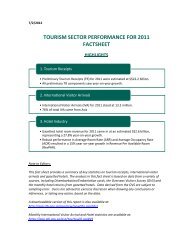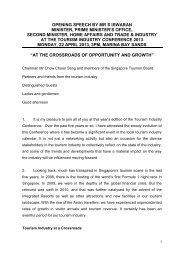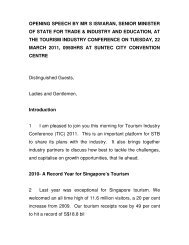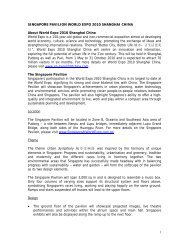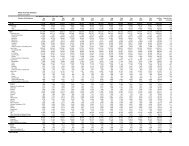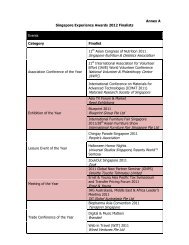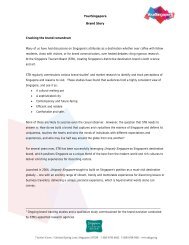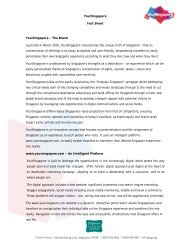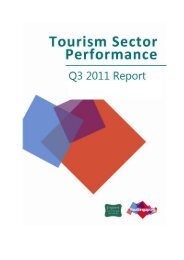i'mpact Singapore Tourism Board Annual Report 2010/2011
i'mpact Singapore Tourism Board Annual Report 2010/2011
i'mpact Singapore Tourism Board Annual Report 2010/2011
You also want an ePaper? Increase the reach of your titles
YUMPU automatically turns print PDFs into web optimized ePapers that Google loves.
INDEPENDENT AUDITORS’ REPORT TO THE MEMBERS OF THE BOARD OF<br />
SINGAPORE TOURISM BOARD<br />
<strong>Report</strong> on the Financial Statements<br />
We have audited the accompanying financial statements of <strong>Singapore</strong> <strong>Tourism</strong> <strong>Board</strong> (“STB”) which comprise the statement of<br />
financial position as at 31 March <strong>2011</strong>; and the statement of comprehensive income, statement of changes in equity and statement<br />
of cash flows for the year then ended, and a summary of significant accounting policies and other explanatory notes, as set out on<br />
pages 59 to 88.<br />
Management’s Responsibility for the Financial Statements<br />
Management is responsible for the preparation and fair presentation of these financial statements in accordance with the provisions<br />
of the <strong>Singapore</strong> <strong>Tourism</strong> <strong>Board</strong> Act, Cap. 305B (the “Act”) and <strong>Singapore</strong> Statutory <strong>Board</strong> Financial <strong>Report</strong>ing Standards (“SB-FRS”).<br />
This responsibility includes designing, implementing and maintaining internal control relevant to the preparation and fair presentation<br />
of financial statements that are free from material misstatement, whether due to fraud or error; selecting and applying appropriate<br />
accounting policies; and making accounting estimates that are reasonable in the circumstances.<br />
Auditors’ Responsibility<br />
Our responsibility is to express an opinion on these financial statements based on our audit. We conducted our audit in accordance with<br />
<strong>Singapore</strong> Standards on Auditing. Those standards require that we comply with ethical requirements and plan and perform the audit to<br />
obtain reasonable assurance about whether the financial statements are free from material misstatement.<br />
An audit involves performing procedures to obtain audit evidence about the amounts and disclosures in the financial statements. The<br />
procedures selected depend on the auditor’s judgment, including the assessment of the risks of material misstatement of the financial<br />
statements, whether due to fraud or error. In making those risk assessments, the auditor considers the internal control relevant to<br />
the entity’s preparation and fair presentation of the financial statements in order to design audit procedures that are appropriate in the<br />
circumstances but not for the purpose of expressing an opinion on the effectiveness of the entity’s internal control. An audit also includes<br />
evaluating the appropriateness of accounting policies used and the reasonableness of accounting estimates made by management, as<br />
well as evaluating the overall presentation of the financial statements. We believe that the audit evidence we have obtained is sufficient<br />
and appropriate to provide a basis for our audit opinion.<br />
57



